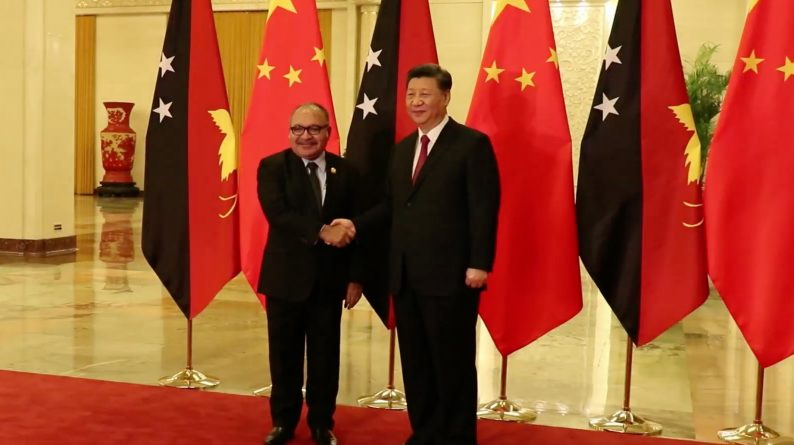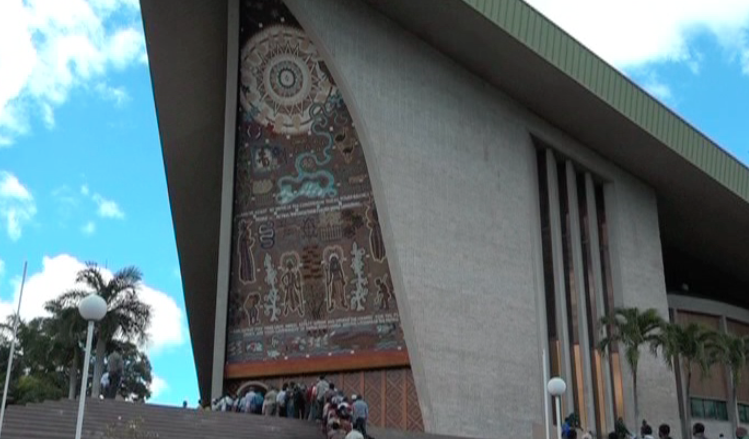By Jeremy Mogi – EMTV News, Port Moresby
Prime Minister Peter O’Neill has always stated that he remains committed to focusing on the key issues affecting Papua New Guinea’s development. Over the last 24 hours, 10 members of his coalition have gone public in their resignations.
It began with Tari-Pori MP James Marape resigning as Finance Minister. Then, a week later, Esa’ala MP Davis Steven resigned as Justice Minister. Those two created the hairline fracture that eventually cascaded into a wider crack as four Governors, Phillip Undialu, (Hela), William Powi (SHP), Sir Peter Ipatas (Enga), William Tongamp (Jiwaka) and Open MP Manasseh Makiba (Komo Margarima), tendered their resignations simultaneously.
Hela Governor Undialu in a press release, stated, “The Prime Minister no longer has the confidence of the majority of Members of Parliament, including members of his own cabinet.”
Powi, Ipatas and Undialu formed the strongest link between the PNC and its Highlands bloc. Their resignations may prove to be a catalyst, as several other MPs are expected to follow suit.
And now, three days following that, three more resignations have occurred.
Tari-Pori MP James Marape, Manus Governor, Charlie Benjamin, and Okapa MP, Saki Soloma.
Despite facing stiff and difficult challenges from the opposition and within his own party, Prime Minister Peter O’Neill is standing firm.
The announcement by Enga Governor Sir Peter Ipatas was made whilst Prime Minister Peter O’Neill was out of the country.

Mr. O’Neill, leading a delegation to China for the “Belt & Road Forum” in Beijing, was made aware of the resignations. His responses were very diplomatic.
“We respect the decisions made by each individual member of parliament. As leader of the party and leader of government, I can assure the people that our party has large numbers in parliament, and that within large groups, movements are expected.’’
That China meeting placed important development agenda regarding Papua New Guinea, which included efforts to improving infrastructure and supply chains to allow for increased production for export.
According to the Prime Minister, of key interest for PNG is to expand production from rural areas, and connecting farmers to markets. He highlighted the need to improve transport networks, product handling, and bureaucracy, among other issues.
PM O’Neill is confident these challenges can be overcome through a much more coordinated approach to the development of infrastructure and capacity building. This, he says, can be achieved through continuing to increase the country’s internal infrastructure development through greater investment, while at the same time strengthen linkages with partner countries that makes transportation more efficient.
Port Moresby’s involvement with Beijing has always been contentious, and the Government’s relationship with China’s Belt and Road Initiative has not gone unnoticed. The US Ambassador to PNG, Catherine Ebert-Gray said overnight:
“The United States, and other friends of PNG are committed to economic and environmental development that respects national sovereignty, builds trust, and directly benefits the people.
“We seek an Indo-Pacific region that is open to opportunities for its people, open for trade and investment, and where people have a say in the development of their communities. This investment in human capacity, and in community development will bring long term positive growth, personal fulfillment, and greater resilience to PNG without undue indebtedness”
Ebert-Gray expressing the concerns raised by other World leaders, including those from our nearest neighbor – Australia.
The PM has, however, been criticised throughout his tenure for constant lack of consultation – an approach that many in politics have deemed discomforting. That in itself, has led to the current scenario in government.
In terms of that, he had this to say “while it has been a privilege working with many of them, and I understand the difficulties that we have taken and of course on the policies of the government that they disagree with but quite frankly I have yet to see a policy proposal in writing or otherwise made to government in the past 8 years.”
The Prime Minister has long defended his decisions regarding a number of critical issues, including the LNG projects and last year, PNG’s hosting of the APEC leader’s week.
“Our government in the history of country, has delivered very visible projects and policies both in infrastructure, both in health and education both in developing the districts and provinces, and making sure that this builds a very solid economy.”
“It is only fitting that we continue to deliver on the good key policies that we have”
He is perhaps PNG’s most astute politician to date. He remains a polarizing figure in PNG’s socio-political arena, with a political acumen has served him well over the course of two decades in parliament.
Social media reactions from the general public have been mixed, with calls for his resignation on the one hand, and strong support on the other, regarding investment into the country. This is perhaps the biggest test to his leadership to date, and whether or not he survives will very much depend on his coalition allies.
Prime Minister Peter O’Neill first came to power during what is now regarded as “The Impasse” a political coup that resulted in utter chaos.
In august 2011, Papua New Guinea entered an unprecedented constitutional crisis in a dispute between Grand Chief Sir Michael Somare and Peter O’Neill. Both claimed to be Prime Minister of Papua New Guinea. The situation raised important constitutional issues. The actual crisis cannot be understood as a question of law in the first place.
It was part of a longer standing power struggle between opposition and government.
O’Neill won that struggle, with it laying the foundation for his dominance in the PNG political arena.
While the next few days will be spent gauging political loyalties on both sides, one thing remains abundantly clear.
Recent movements in the political landscape point to this potentially being the strongest challenge to date, against the prime ministership of Peter O’Neill.


